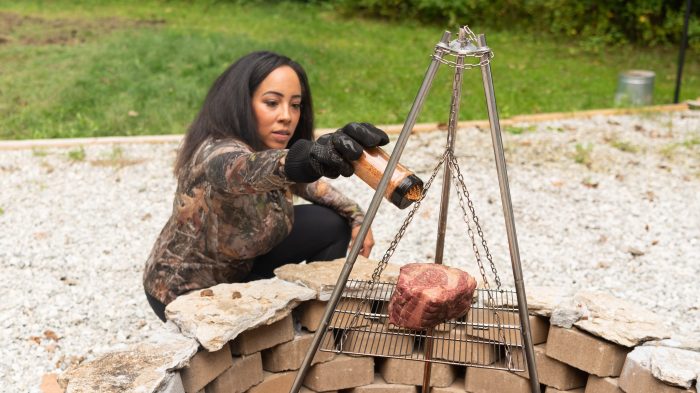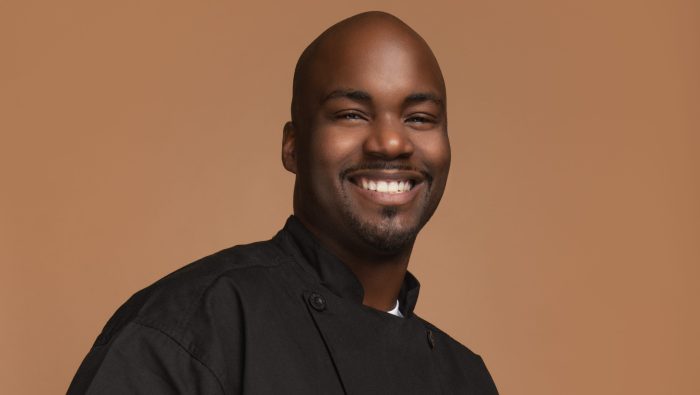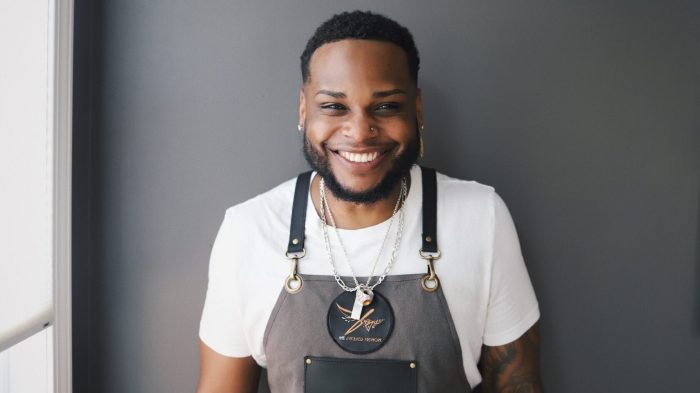None of the middle schoolers at Carter Woodson Elementary School in the Bronzeville neighborhood of Chicago have tasted anchovies before, but that’s not stopping them from trying. On the count of three, they all popped an oil-slicked anchovy fillet into their mouths. Some were neutral, one kid likes the taste, and a few others shrieked and laughed when they realized how salty the tinned fish is. “It tastes like cod liver oil,” 12-year-old Pierre said with a groan.
Those were the exact reactions chef Sebastian White, founder of The Evolved Network, wanted to see. These classes aim to get the kids to try new things and learn about the emotions food can evoke and the change food can make in their lives.
The mission of The Evolved Network, which was founded in 2020, is to use culinary arts to expose Black and Latino kids on the South and West sides of Chicago to a new career path and help them grow by combining culinary education with therapeutic methods.
“If I can create a situation where they try something different, it expands how they think,” White said. “If they feel like they can’t leave a certain box society has put them in, how do they know what else is out there in the world that they may love and enjoy?”
On the day I visited, the kids made black garlic and chili Caesar salad, using brussels sprouts instead of lettuce. Each kid was vocal and thoughtful about their likes and dislikes, but none of them refused when White urged them to taste each ingredient, including the sweet fermented black garlic, which most kids in this program would recoil at after hearing what it was.
Ayana, a sixth grader who’s passionate about becoming a chef, said that at home, she makes dishes such as raspberry crumble and paella with her mom. When White did an exercise asking the kids what foods they pair with emotions — an exercise to get them to identify emotional eating — Ayanna was aghast when anger came up. “I’m never angry when I eat,” she said. “That’s disrespectful to food!”
James Beard winner Andrew Black goes off menu in Oklahoma CityRead now
At Carter Woodson, White works with the school’s counselor, Lorri Lanier, who aims to expose the children to activities such as yoga, the opera, and cooking. “At this age, it’s just about piquing their interest and not telling them what they could be, but showing them and letting them choose from lots of different options,” Lanier said. All her activities, including White’s culinary arts sessions, bring out each kid’s personality and passions.
Ayanna and Pierre expressed the most interest in culinary arts, but eighth grader Tiares wants to be a doctor. She’s skeptical and careful, scientific in her analysis, identifying that the salad isn’t to her taste because of the acidity and suggesting adding more cheese to cut the sharpness. Jamyle, 13, wants to go into construction and he’s really adept at knife work, deftly slicing through brussels sprouts. Later, he showed me a candy dispenser he made in woodworking class.
Although White would be delighted if some of his students go into the culinary arts, that’s not the primary purpose of his work. A psychotherapist with a master’s degree in clinical psychology, White wanted to do something to honor his father and aunt after they died in 2020. His aunt was a principal and an avid gardener, while his father was a talented cook with a master’s degree in developmental psychology. With The Evolved Network, White combined their passions.
 Use these tips to become a backyard grill master Read now
Use these tips to become a backyard grill master Read now
“What we’re trying to create is a holistic healing space for kids by way of food and farming,” he said, adding that The Evolved Network is currently fundraising to complete their goal of creating an urban garden. “Everything about food, from planting a seed to watching it grow to the process of it ending up on a plate to the community that is gathered around the table is inherently therapeutic.”
With an annual budget of $240,740 as of 2023, The Evolved Network funds its projects through grants and donations, some of which come through monthly collaborations White puts on with such Chicago chefs as Tigist Reda, the chef and owner of Ethiopian restaurant Demera, Devon Quinn of the buzzy new Avondale restaurant Eden, and James Beard award-winner Paul Kahan at his Wicker Park luncheonette, Dove’s.
I attended White’s pop-up — and fundraiser — at Luella’s Southern Kitchen, where he and Darnell Reed, the executive chef and owner of Luella’s, partnered on a pan-Southern menu for Mother’s Day. The star of the five-course menu was the dirty rice arancini, White’s creation. It was paired with a spicy and vinegary piri piri sauce, with crawfish in the center of the arancini. Reed and White also worked together to create a creamy grits dish — at Luella’s, they hand-grind corn with a stone mill to make grits — with lobster and andouille albondigas, with coconut salsa verde and red sorrel.
At the dinner, I met White’s mother, Althea Satterfield-White, who was visiting from Texas. She said she told White at a young age that he had a gift for cooking that he should explore but that he was insistent on working with kids and going into psychology. “Kids will fight you, but parents can tell. Now he’s doing both,” she said proudly. Pointing to her granddaughter, White’s 2-year-old daughter Ever, who sometimes eats cherry tomatoes right off the vine in White’s garden, Satterfield-White said, “Now she is going to cook even better than her father.”
 How Kareem Queeman carved his path to successRead now
How Kareem Queeman carved his path to successRead now
As the dinner went on, we shared wine and cocktails in a bottle, and the diners — who are mostly, including Satterfield-White, longtime Chicago residents or were raised here — discussed how the city is changing. The systemic injustice in the city is what The Evolved Network is fighting against, an injustice that leads to increased food insecurity and causes Black and Latino kids to experience food shaming — judgment about what they eat or how much they eat.
“My father instilled a lot of values in me, including this idea of leaving your children more than you had and giving your children a better chance to succeed than what you had,” White said. “Initially, I thought he meant just for your own kids. But he meant something bigger. “
Recently, White and Jodi Fyfe, CEO of The Paramount Group, organized a meeting for Chicago community leaders in food, sustainability, and education. “These kids are looking to be trusted, they’re looking to lead. But we have to show them what trust looks like and give them these opportunities,” White said in his opening remarks. The two central questions were, “What is your vision for a healthy, thriving community?” and “How can we support one another in realizing that vision?”
Selma Sims, the CEO of Gardeneers, an organization developing school gardens on the South Side and West Side, spoke about the conditions that have led to food insecurity in Black Chicago neighborhoods and how that has limited many children’s knowledge of agriculture and food. And that limited knowledge sometimes can be exaggerated by others, who might tell sensational stories about inner-city children who don’t know what a potato is, intending to bring awareness to the issue but inadvertently contributing to stereotypes.
Sims said shaming kids for not knowing about food contributes to the issue and ignores the systemic nature of it. “Historically, the system was built and engineered for us to be in this particular situation. We’ve been removed from the land, and that has increased the stigma of us being tied to the land.”
This is a bulk of White’s work, dismantling those perceptions of our worth and abilities caused by centuries of slavery and colonization. He said, “I do think that colonization has created a mindset where we feel we deserve less, and that has penetrated into our consciousness in a particular way. It’s all just inaccurate though, and we’re really trying to break down those inaccuracies through food.”
And above all, programming is about connection. At the end of the meeting, White told the attendants that one of his previous students told him he wanted to be a chef because he wanted to make a meal his mom would like. White said, “It sounds cheesy, but it’s all about love at the end of the day. Love and connecting with other people.”
Nylah Burton is a travel, lifestyle, and entertainment writer with bylines in New York Magazine, Vogue, and Travel + Leisure.



